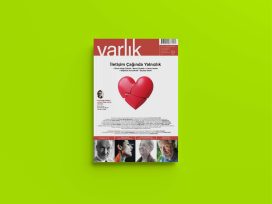An interview with Todd May
Süreyyya Evren: Before focusing on the Israeli attacks on Lebanon, I’d first like to discuss “global cultural polarizations”, which have been growing since 9/11. What do you think of this development?
Todd May: It seems to me to be a complex situation right now. First, you have the US/Israel axis, which in many ways is opposed not only to the Arab world and the global South, but also to Europe. Then, within Europe, there are polarizations, for example, in France between whites and North Africans or in Germany between whites and Turks. These are national cultural polarizations. There are economic ones as well, polarizations that have been around since the pre-9/11 period. This continuity is recognized by everyone but Americans, who cannot seem to realize that 9/11 is not a huge marker for anyone outside the US, except in terms of a more aggressive US foreign policy. This overlay of polarizations offers a chance for organization, since it reveals splits among elites that can be exploited. On the other hand, if we are to take advantage of that opening, we will need to overcome our own provincialisms. Solidarity has to be truly global, in which everyone is considered an equal partner. We cannot have a mass of identities but must develop a real sense of radical equality instead.
SE: And specifically on Israel: what role does Israel play in this climate of global polarization?
TM: The answer to that question hinges on how one sees the US/Israel relationship. Many progressives believe that it is the US that pulls the strings. My belief is that Israel is at least as influential on US policy as vice versa, probably more so. If we follow that line of thought, then Israel is a destabilizing factor that the US has to deal with. On the one hand, it does a lot of dirty work for the US, for example in trying to destroy Hezbollah (and Lebanon along with it). However, the US must then do its own damage control because of its association with Israel. In general, I would say that Israel stands as a great performative contradiction: held up to the rest of the world as a beacon of democracy while it oppresses Palestinians inside and outside its borders and terrorizes the region.
SE: In your article “The End of the Holocaust”, you said, “It is time, indeed it is past time, to break the discursive link between Israel and the Holocaust”. Actually this link is not really alive in the Middle East (except Israel). So we are talking about having it broken in the “West” more or less. How could this be done and what could be the possible consequences if this link is really broken in the West?
TM: In order for it to happen in the West, there needs to be a two-pronged strategy. First, one must hold Israel accountable. Second, one must do so without apology. I have long insisted that Israeli behavior is not a Jewish issue; it is an issue of human rights and democracy. I believe that refusing to give Zionist supporters the first step – the normative link between Israel and Jewish history – is a crucial element in combatting the charge of anti-Semitism that follows even the mildest criticisms of Israel. The consequences of this are hard to predict. Were Israel really to be held to humane standards of conduct, US support for Israel would plummet. We should not become too optimistic about this possibility, however. The hold the pro-Israel lobby has on Congress cannot be overestimated.
SE: Global cultural polarizations are being used to manipulate politics in its entirety. Very holistic images are produced for “others” in different parts of the world. And security paranoia, police state applications, phobias, nationalisms, etc. are spreading in many places. How does this effect the “Left” in general?
TM: It is puzzling. One would think that crackdowns like these would induce a sense of righteous anger on the Left. So far, that hasn’t much happened. There have been massive demonstrations, to be sure, but not a sustained movement, especially in the US. The reasons for this, I think, are twofold. First, the politics of fear has been utilized in the US and Europe very effectively. People are afraid, and their fear is manipulated into political paralysis. Second, there is a sense of hopelessness. In some ways, that stems back to the first Gulf War, when the Left could not stop or even slow down Western military incursion. However, there is another element as well. With the rise of religious fundamentalism as an oppositional force, there is an ambivalence about the Left’s joining forces with them. This ambivalence is justified, but it puts the Western Left in the dilemma of either having to support religious fundamentalism or doing nothing. There is a third path – connecting with those who are in favour of the equality I spoke of above. This is a longer-term project, however, that must deal with both the sense of fear and of hopelessness that haunts us.
SE: What are the main social polarizations inside American society today? And how do the media and elites encourage these?
TM: In the short term, there has been increased support for the President. This will not last, however. What gets him support is a fear-mongering that operates on several fronts and that the media participates in. It has not only to do with terrorism, but with homosexuality, immigration, and a sense of breakdown of traditional, religiously based moral values. What all these have in common is a fear of the Other, a fear that is stoked by the media because of its sensationalism. I don’t think we should see the media as always in lockstep with the political elites, although that does happen. Here the analysis must be a little more subtle. There is a convergence between the fear manipulated by the political elites and the sensationalism that is a staple of the media. When they come together, fear and paranoia are reinforced. Everybody wins, except of course those who are dominated by this fear and paranoia, which is to say nearly everyone.
Published 6 August 2007
Original in English
First published by Varlik 9/2006
Contributed by Varlik © Süreyyya Evren, Todd May/Varlik Eurozine
PDF/PRINTNewsletter
Subscribe to know what’s worth thinking about.



